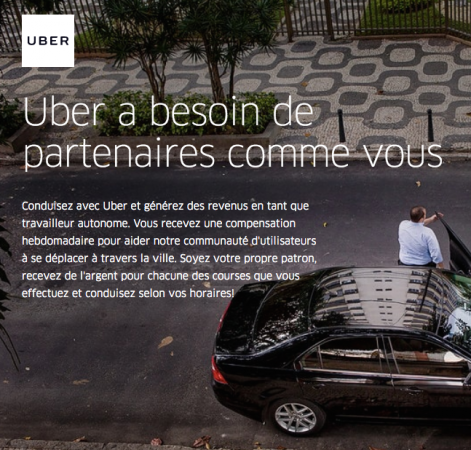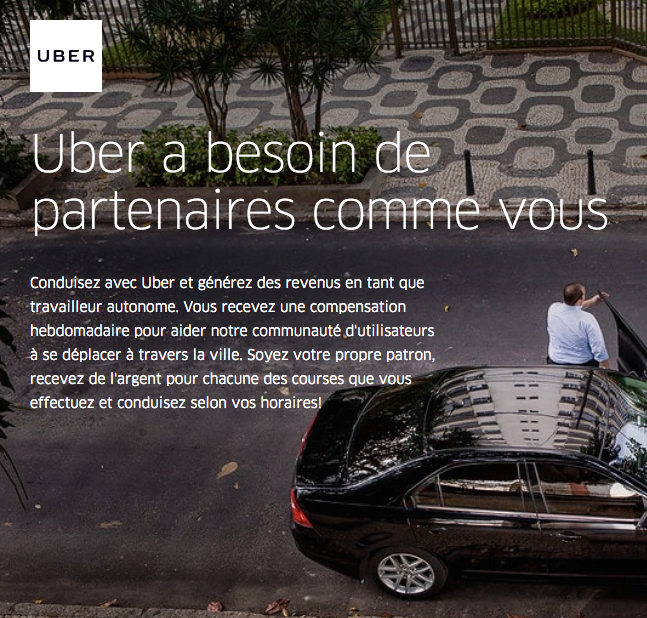Uber loses in European Court. A fitting reminder of the rule of law...

(B2) The European Court of Justice has just decided on Tuesday (December 20) on an essential question. Is Uber right when it claims not to be a transport or taxi service, but a simple telephone or internet 'app' and therefore not to be bound by taxi legislation?
An act of unfair competition?
It all starts with an appeal by the professional association of taxi drivers in Barcelona, which lodges a complaint with the Barcelona Commercial Court. These Catalans believe that Uber's practices in their city constitute " misleading practices and acts of unfair competition » ; Uber using non-professional drivers without having the licenses and approvals provided for taxis. Uber of course the opposite, believing that it is only an electronic platform, which only exercises its right to the free provision of services guaranteed throughout the European Union and can in fact only be subject to the e-commerce directive.
The Grand Chamber of the Court seized
In short, the lawyers of the American giant relied on European legislation to thwart a national or local obligation. The European judges have, therefore, very logically been seized for their opinion. And their judgment is interesting in more ways than one. Because the question about the legality of the operation of Uber arises in several European countries: in France, in the United Kingdom, in Belgium, in Germany... It is also logical that the European judges met in a of the most solemn formations of the Court of Justice: the Grand Chamber.
A three-step reasoning
The European judges started from the reality of the services provided by Uber, qualifying them at each stage, thus allowing them to reach a conclusion: Uber is above all a transport service and not an internet service.
First, the service provided is not limited to an intermediation service consisting of connecting, by means of a smartphone application, a non-professional driver using his own vehicle and a person who wishes to make an urban trip ". He " creates at the same time an offer of urban transport services, which it makes accessible in particular by computer tools and of which it organizes the general operation in favor of people wishing to use this offer for the purposes of urban travel ».
Second, the application provided by Uber is " essential both for drivers and for people wishing to make an urban trip ” notes the Court.
Third, Uber” exerts a decisive influence on the conditions of the service of the drivers ».
All these elements prove, according to the Court, that “ this intermediation service "must be considered as doing" integral part of an overall service the main element of which is a transport service ". It thus meets the qualification " not an information society service ", but of " transportation service ».
Conclusion: force is with the local law
Additional clarification from the European Court, non-collective urban transport services and the services that are inseparably linked to them (such as that provided by Uber), "have not given rise to the adoption of rules on the basis of this policy " at the European level. This means that "as EU law currently stands", it is "up to the Member States to regulate the conditions for the provision of such services". They can do it, on one essential condition: to respect “ the general rules of the Treaty on the Functioning of the European Union ».
Commentary: a logical way out in the face of a temptation to undermine the foundations of the rule of law
This solution is quite logical and the observation of the law joins the observation of reality practiced every day by the consumer. Uber is doing taxi not providing internet service. It would be misleading to claim otherwise. The American giant, which had tried to circumvent the usual rules of the market, by inventing a legal 'outside the ground' of its own, must come back to earth.
Its application, in itself revolutionary, is interesting. His criticism of the taxi market (often ossified) can be heard. Claiming that by this simple fact, we are not bound to respect any law (whether social, fiscal or administrative) amounts to contesting several of the fundamental principles on which European society is built.
Uber's position is challenging. The ambition of this company (like that of Amazon or Google) is not, in fact, simply to provide a service, "for the good of the consumer", or even to make "a small" place and "a little profit. It is really to break a market, to propose a model, to ensure a dominant position and, thus, then to be able to govern it. Beyond the pure economic question, it is indeed a questioning of the rule of law, and of democracy - which provides for a law, fair, applicable to all (big or small) - and the regulated market economy, all European values, which Uber wants to fight.
(Nicolas Gros-Verheyde)
Download thestop of the court


What does this have to do with your usual content?
B2 is an online media, which claims not to be interested only in defense or foreign policy issues (developed further in our 'Pro' version), but more generally in everything related to political Europe. This judgment is therefore interesting. Because it helps set the record straight on the rule of law. B2 has always had the principle of offering its readers subjects, chosen according to current events, with our own sensitivity, according to a varied palette, in order to open up the fields of vision. It's not just Brexit or defence...
Great article, thank you, the summary of the legal foundations of the CJEU is interesting. However the links (to the commentary as well as the decision are unfortunately KO).
We have restored the link to the judgment, which has effectively disappeared in the meanders of the internet 😉 (otherwise the this is)